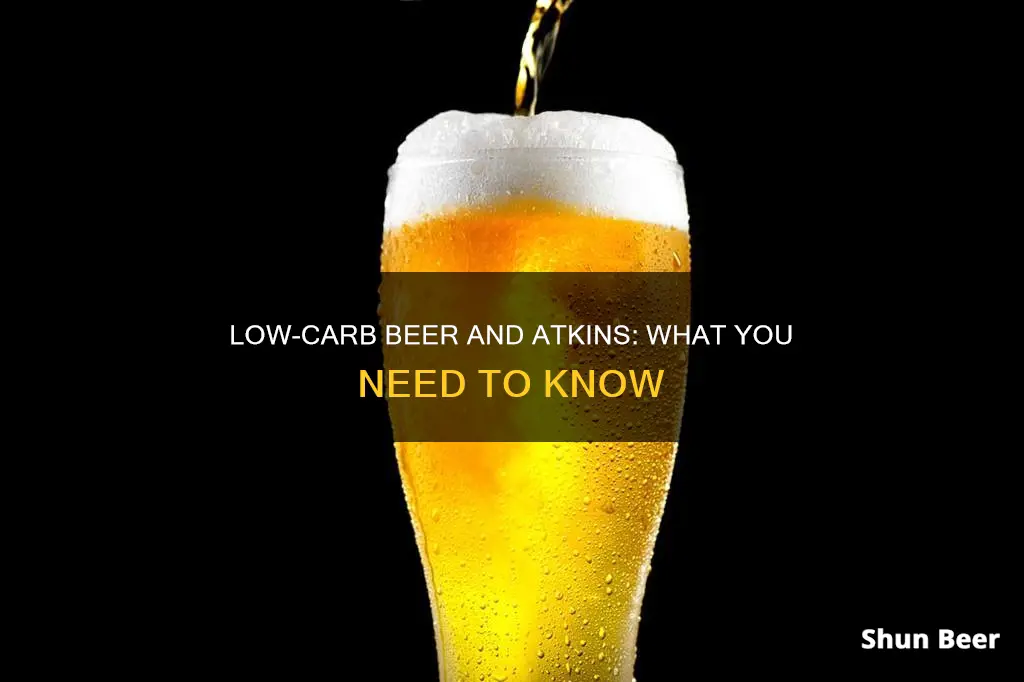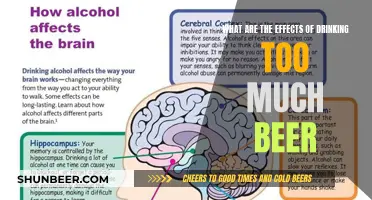
The Atkins diet is a low-carb weight loss plan that allows for the consumption of alcohol in moderation. While beer is generally not recommended due to its high carb content, low-carb beers are considered acceptable in small amounts during the Ongoing Weight Loss (OWL) phase of the diet. It is important to note that alcohol does contain calories, and excessive consumption may hinder weight loss progress. When following the Atkins diet, it is crucial to prioritize distilled spirits, dry wines, and low-carb mixers to minimize carb intake.
| Characteristics | Values |
|---|---|
| Alcohol on Atkins Diet | Allowed in small amounts |
| Best Alcoholic Drinks on Atkins Diet | Dry wines with no added sugars, spirits such as scotch, rye, vodka, gin |
| Worst Alcoholic Drinks on Atkins Diet | Beer, cocktails |
What You'll Learn
- Beer is not recommended on the Atkins diet due to its high carb content
- Dry wines with no added sugars are allowed on the Atkins diet
- Spirits such as vodka, rum, whiskey, and gin are zero-carb and suitable for the Atkins diet
- Alcoholic drinks with low carbs can still contain calories, which the body prioritises burning over fat
- Alcohol can be consumed on the Atkins diet, but it may stall weight loss

Beer is not recommended on the Atkins diet due to its high carb content
If you are following the Atkins diet, it is best to avoid beer and opt for low-carb alcoholic drinks such as pure spirits like vodka, rum, tequila, whiskey, and gin, which contain zero carbs. Hard seltzers are also a good option, with around 2 grams of carbs per can. When it comes to wine, dry varieties tend to have lower carb counts, so look for brut champagne, Sauvignon Blanc, Pinot Grigio, Cabernet Sauvignon, or Merlot.
It is important to note that while these drinks are lower in carbs, they still contain calories. Alcohol provides calories that your body will burn through before returning to burning fat. Therefore, if you notice a stall in your weight loss, you may need to cut back on alcohol. Additionally, be mindful of mixers and choose diet tonic or soda to avoid extra sugar.
For those on the Atkins diet, it is recommended to wait until you are in Phase 2 (Ongoing Weight Loss) before introducing any alcohol. Even then, it is best to limit your intake to one or two drinks per week, spaced apart if possible. This is because alcohol causes your body to prioritise metabolising the alcohol over burning fat. Furthermore, drinking can lead to snacking, which can quickly kick you out of ketosis.
In summary, while you can technically have an occasional beer on the Atkins diet, it is not recommended due to its high carb content. Opt for lower-carb drinks and be mindful of your overall intake to ensure you stay on track with your weight loss goals.
Mono and Beer: Is It Safe to Drink?
You may want to see also

Dry wines with no added sugars are allowed on the Atkins diet
Wine is considered dry if it contains 10 grams of sugar or less per bottle. While it is challenging to find a completely dry wine, there are several keto-friendly options available. When shopping for dry wines, look for sparkling wines such as champagne, cava, and prosecco, as well as dry reds like Merlot and Pinot Noir, and whites such as Sauvignon Blancs. Many bottles will have the word "dry" on the label. Another helpful tip is to choose wines with a higher alcohol content, as this indicates that most of the sugar has been fermented into alcohol.
When following the Atkins diet, it is recommended to choose wines with the lowest amount of residual sugar. Sparkling wines labelled Brut and Extra Brut typically have the lowest amounts of residual sugar, with as little as 1.5 grams of carbs or less per glass. Sauvignon Blancs, a full-bodied white wine, also make an excellent choice with 3 grams of carbs per glass. For a lighter red wine option, Pinot Noir is a great choice with just 3.4 grams of carbs per glass and it pairs well with fish, salads, and richer ingredients like mushrooms. Merlot, a heavier red wine, has 3.7 grams of carbs per serving and is an ideal pairing for steak dinners.
It is important to note that wine servings are typically 5 ounces, and while an occasional glass of wine won't take you out of ketosis, excessive consumption might. Most wine labels do not list standard nutrition facts, so you may need to do some calculations and research to determine the sugar and carb content of each bottle. Look for the ABV (alcohol by volume) and residual sugar content, as higher values indicate higher carb content.
In summary, dry wines with no added sugars are permitted on the Atkins diet, but moderation is key. By choosing wines with lower residual sugar and higher alcohol content, you can enjoy an occasional glass while staying aligned with your dietary goals.
Enjoying Beer on Naples Beach: What You Need to Know
You may want to see also

Spirits such as vodka, rum, whiskey, and gin are zero-carb and suitable for the Atkins diet
Vodka, rum, whiskey, and gin are spirits that are suitable for an Atkins diet as they contain zero carbs. However, it is important to note that alcohol should be consumed in moderation as part of a keto lifestyle. While these spirits are low in carbs, they still contain calories, and the body needs to burn off these calories before it can get back to burning fat.
Vodka is a distilled alcoholic spirit that can be made anywhere in the world but is traditionally associated with Russia and Poland. It is typically made from grains and potatoes, resulting in a subtle, clean taste. Vodka is very versatile and can be used in a wide range of cocktails. It has a neutral taste and can be distilled from almost anything, including grains, potatoes, beets, grapes, and other bases.
Rum, on the other hand, is distilled from sugar cane juice or molasses, resulting in a slightly sweeter taste with hints of caramel and vanilla. It originated in the West Indies and became popular in Britain after a crop failure in 1675. Rum is also a versatile spirit and can be used in various cocktails, although it has a stronger taste than vodka.
Whiskey is distilled from malted grains such as corn, rye, wheat, and barley, and it is typically aged in charred oak barrels. It has a roasted, malted grain flavor with oak undertones and offers a diverse range of flavor profiles.
Gin is distilled from neutral grains such as barley, corn, rye, and wheat, and it is flavored with botanicals, resulting in a herbal and dry profile. It is perfect for dry cocktails and pairs well with lighter mixers, fruits, and herbs.
When following the Atkins diet, it is important to avoid mixing these spirits with juice, tonic water, or non-diet soda. Instead, they can be substituted with seltzer, diet tonic, or diet soda to create delicious low-carb cocktails.
Breastfeeding and Beer: What's Safe?
You may want to see also

Alcoholic drinks with low carbs can still contain calories, which the body prioritises burning over fat
When consumed, alcohol is burned by the body for fuel, which means that the body will not burn fat until the alcohol is used up. This does not necessarily stop weight loss, but it does postpone it. If you are on a low-carb diet like Atkins and have added alcohol to your regimen, you may need to cut back if you notice that your weight loss has stalled.
The short answer is that yes, you can drink low-carb beer on Atkins. Beer typically has 2-17 grams of carbs per serving, with lighter beers on the lower end of the spectrum. However, it is important to be mindful of the calories in beer and other alcoholic drinks, as well as the potential for alcohol to affect your weight loss efforts.
If you are on the Atkins diet, it is recommended that you wait until you have settled into Phase 2, Ongoing Weight Loss (OWL), before adding alcohol. Even then, it is best to limit alcoholic drinks to one or two drinks per week, spaced apart if possible. This is because alcohol can stall weight loss efforts, as the body prioritises metabolising it over burning fat.
When choosing alcoholic drinks on a low-carb diet, it is important to avoid sugary mixers like juice, tonic water, and non-diet soda. Instead, opt for seltzer, diet tonic, or diet soda. Additionally, be mindful of the snacks you consume while drinking, as they can also impact your weight loss efforts.
Drinking after one beer: What's the harm?
You may want to see also

Alcohol can be consumed on the Atkins diet, but it may stall weight loss
The Atkins diet recommends that people avoid or limit sugar, refined grains, "diet" and "low-fat" foods, high-carb fruits, starchy vegetables, and legumes. Instead, people should base their diet on foods such as meats, fatty fish, eggs, low-carb vegetables, full-fat dairy, nuts, seeds, and healthy fats.
When it comes to alcohol, it is possible to drink it in small amounts while on the Atkins diet. However, it is important to stick to dry wines with no added sugars and avoid high-carb drinks like beer and cocktails, as they tend to have the most sugar among alcoholic beverages. Liquor is carb-free, but flavored liqueurs contain extra sugar and carbohydrates. It is also important to be mindful of mixers, as sugary juices, sodas, and tonic water can add a significant amount of carbohydrates to a drink.
While alcohol can be consumed on the Atkins diet, it is important to remember that it may stall weight loss. This is because the body prioritizes metabolizing alcohol over burning fat. Additionally, alcohol contains calories, and these calories need to be burned off before the body can return to burning fat. Therefore, if weight loss stalls, it may be necessary to cut back on alcohol.
Overall, while alcohol can be consumed on the Atkins diet, it should be done in moderation and with careful consideration of the type of alcohol and mixers being consumed.
Mixing Prozac and Beer: Is It Safe to Drink?
You may want to see also
Frequently asked questions
Yes, you can drink low-carb beer on Atkins, but it is recommended to wait until you have settled into the Ongoing Weight Loss (OWL) phase of the diet. Beer typically contains 13 grams of carbs per serving, so it is important to count these into your daily carb count.
Pure spirits such as vodka, rum, tequila, whiskey, and gin are carb-free and good options for drinks on the Atkins diet. Dry wines like brut champagne, Sauvignon Blanc, and Pinot Grigio are also low-carb options. It is recommended to avoid high-carb drinks like beer and cocktails, as they tend to have the most sugar.
Alcohol contains calories and can impact weight loss. When you drink alcohol, your body prioritizes metabolizing it first, which can slow down the burning of fat. Additionally, drinking alcohol can lead to snacking, which can further impact weight loss. It is recommended to limit alcohol consumption to one or two drinks per week, spaced apart if possible.







